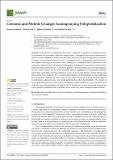Por favor, use este identificador para citar o enlazar a este item:
http://hdl.handle.net/10261/271673COMPARTIR / EXPORTAR:
 SHARE SHARE
 CORE
BASE CORE
BASE
|
|
| Visualizar otros formatos: MARC | Dublin Core | RDF | ORE | MODS | METS | DIDL | DATACITE | |

| Título: | Genomic and Meiotic Changes Accompanying Polyploidization |
Autor: | Blasio, Francesco; Prieto, Pilar CSIC ORCID ; Pradillo, Mónica; Naranjo, Tomás | Palabras clave: | Allopolyploidy Interspecific hybridization Unreduced gametes Cytological diploidization Genomic changes |
Fecha de publicación: | 3-ene-2022 | Editor: | Multidisciplinary Digital Publishing Institute | Citación: | Plants 11(1): 125 (2022) | Resumen: | Hybridization and polyploidy have been considered as significant evolutionary forces in adaptation and speciation, especially among plants. Interspecific gene flow generates novel genetic variants adaptable to different environments, but it is also a gene introgression mechanism in crops to increase their agronomical yield. An estimate of 9% of interspecific hybridization has been reported although the frequency varies among taxa. Homoploid hybrid speciation is rare compared to allopolyploidy. Chromosome doubling after hybridization is the result of cellular defects produced mainly during meiosis. Unreduced gametes, which are formed at an average frequency of 2.52% across species, are the result of altered spindle organization or orientation, disturbed kinetochore functioning, abnormal cytokinesis, or loss of any meiotic division. Meiotic changes and their genetic basis, leading to the cytological diploidization of allopolyploids, are just beginning to be understood especially in wheat. However, the nature and mode of action of homoeologous recombination suppressor genes are poorly understood in other allopolyploids. The merger of two independent genomes causes a deep modification of their architecture, gene expression, and molecular interactions leading to the phenotype. We provide an overview of genomic changes and transcriptomic modifications that particularly occur at the early stages of allopolyploid formation. | Versión del editor: | http://dx.doi.org/10.3390/plants11010125 | URI: | http://hdl.handle.net/10261/271673 | DOI: | 10.3390/plants11010125 | Identificadores: | doi: 10.3390/plants11010125 e-issn: 2223-7747 |
| Aparece en las colecciones: | (IAS) Artículos |
Ficheros en este ítem:
| Fichero | Descripción | Tamaño | Formato | |
|---|---|---|---|---|
| Meiotic_Changes.pdf | 1,4 MB | Adobe PDF |  Visualizar/Abrir |
CORE Recommender
Page view(s)
54
checked on 19-may-2024
Download(s)
99
checked on 19-may-2024
Google ScholarTM
Check
Altmetric
Altmetric
Este item está licenciado bajo una Licencia Creative Commons

